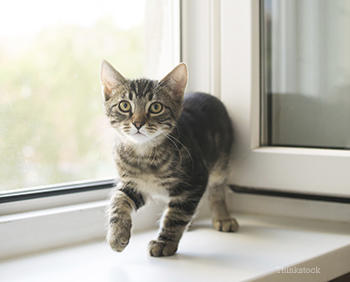
If you’re reading this, then you probably just brought a new kitten home, or you’re planning on bringing a new kitten home soon. Either way, congratulations! There’s nothing like a cute, fuzzy new addition to the family.
While it’s important to start right in on the cuddling and training needed by a new kitten, it’s also crucial to get a head start on your kitten’s health. You want to make sure your new friend gets off on the right foot, and this means scheduling your kitten’s first veterinary visit. Depending on your new kitten’s age and expected lifestyle, there are a lot of different things you can expect from your veterinarian. Read on to learn more.
Your Kitten’s First Veterinary Visit
When you take your kitten to the veterinarian for the first time, your good doctor will probably give him or her a physical exam before anything else. This is really important – your veterinarian can find physical problems with your kitty just by looking him or her over, such as poor gait or skin problems, and get your kitten on a treatment plan right away.
In addition, your veterinarian will want to make sure your kitten is free of a variety of illnesses and conditions, and to do so he or she will likely perform a variety of tests, including:
- Fecal exam to check for intestinal parasites
- Start parasite control (through the use of prescription medication) to treat intestinal parasites and prevent heartworm
- Begin protecting your kitten from flea- and tick-borne diseases
- Chemistry tests to help evaluate internal organ status
- A complete blood count (CBC) to screen your pet for infection, inflammation, or anemia and other blood-related conditions
- Screening for Feline Leukemia Virus (FeLV) and Feline Immunodeficiency Virus (FIV), especially if your veterinarian determines your cat may be at risk for exposure to infected cats
Vaccines
The need for vaccinations depends on several factors, including your cat’s age and your geographic location. In general, however, all kittens and cats should have the following vaccines:
- Core vaccine that includes feline herpes virus, feline calcivirus, and feline panleukopenia
- A rabies vaccine, which will initially require boosters at intervals determined by state regulations
- FeLV and FIV vaccines, depending on your veterinarian’s recommendations
There are a number of other vaccines that could be recommended by your veterinarian. In addition, most vaccinations require boosters, from once every few weeks (for kittens) to once annually or every few years. We understand that this might seem confusing, vaccines are really important in preventing illness! The best thing to do is talk with your veterinarian, who will set up a vaccination schedule appropriate for your cat.
Any Questions?
Your kitten’s first veterinary visit is also a great time to discuss other topics with your veterinarian, such as the health benefits of spaying and neutering, diet, dental health, litter box training, socializing, regularly scheduled veterinary visits and wellness bloodwork, and other ways to keep your kitten a well-behaved and well-adjusted member of your family. Remember this rule of thumb – don’t be afraid to arrive at your veterinarian’s office with a list of all the questions you might have about your new kitty! There are no dumb questions when it comes to keeping your pet healthy and happy.
If you have any questions or concerns, you should always visit or call your veterinarian – they are your best resource to ensure the health and well-being of your pets.
